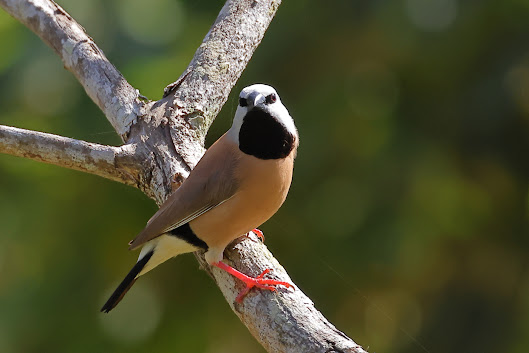 Golden-headed Cisticola not so rusty when it comes to catching a feed
Golden-headed Cisticola not so rusty when it comes to catching a feedSee the eagle-eyed birdo doing his stuff. Eyes always on the move, missing nothing. Searching for Pale-vented Bush-Hens (Amaurornis olivaceous). Listening intently for telltale murmured 'tuck tuck tucking' from the long grasses.
Pair of birds yesterday fled the drying margins of the only pool left in creek, which runs southwest-northeast in a southern semicircle around the main lagoon. Later got close to one bird but no clear views. Ditto with a pair of Buff-banded Rails (Gallirallus philippensis).
Prowl the pool area again today. Get a whiff of something unpleasant in the air. Ignore it and continue the search. No hint of hens or rails. But that smell. What is it?
Stare at shallow water. Penny drops. Those hundreds of small pale white 'leaves' patterning the yellow algal bloom are dead fish. Those three small branches are dead eels.
So busy looking for birds, I've missed the death of every fish in the 30-metre S-shaped shallows. It probably began at least two days ago. Yesterday's searing 36 Celsius would have virtually cooked the oxygen-starved fish.
So much for eagle eyes, what I need is a beagle's nose! And even the tiniest bird-brain might have pondered why the hens and rails were hanging around the margins of the pool.
Got things back on track an hour later with a Little Bittern sighting. Heard stealthy movement high in a patch of Scleria I was skirting. The bird, a female, took off low as always and plunged back down into more of the two-metre grass. Never any point in chasing once the bird has flown.
But the encounter may offer an insight worth chasing about the daytime habits of the birds. In a possible case of another penny dropping, it struck me that the birds' rare gurgles seldom come from areas that lack a small tree springing from the dense Scleria (Razor Grass). This applies particularly to two spots in front of the hide.
Today's movement came from further west, close to a small Tulip Tree. On checking under the tree I found a small raised patch of bent grass. I'm tempted to describe it as a natural cathedral, but an A-framed structure with high flattened grass floor will do.
Exploration near the hide and other areas would be much more intrusive. So I'll see if there are spots elsewhere that I might test the theory, without overly upsetting any birds - or anyone else.
 One bird much easier to find was the male Leaden Flycatcher, on nest duty. The job is shared equally. Bill is open for cooling (bigger birds sometimes pant).
One bird much easier to find was the male Leaden Flycatcher, on nest duty. The job is shared equally. Bill is open for cooling (bigger birds sometimes pant). 



Fantastic blog tony
ReplyDeleteThe photo of the Cisticola is great! What a bright eye!
ReplyDeleteI'm with Boobook Tony, your blog just keeps getting better and better.
ReplyDeleteHi Tony
ReplyDeleteGreat shot of the Cisticola, with insect.
Are the Little Bitterns creating camp sites under the trees?
Your rails are behaving typically. They are great skulkers. They don't give away free shots easily.
Cheers
Denis
Good post.
ReplyDeleteSound like the wildlife is feeling the heat up there. twenty degrees here to day which by local standards is rather hot.
Hi Boobook: Careful. My hats only just fit as it is! Hope all your caterpillars are still leaving some leaves for the trees.
ReplyDeleteGidday Mick: Sharp eyes too. Been trying to track down the nest of one bird, but it always sees me lurking and ducks off till I'm gone.
ReplyDeleteHi Duncan. I think birds are kinder to me than the insects. And perhaps the fish weren't a dead loss after all.
ReplyDeleteHi Denis: It seems to make sense for such a shy bird that sits quietly all day to seek cover from above. But it's mere speculation on my part as yet.
ReplyDeleteOn BB Rails, they can be remarkably open to approach at times, unlike most of their relatives.
Gidday Mosura: Yes, things starting to hot up, though it's been merely moderately warm for most of year.
ReplyDeleteI don't mind 20C, in the middle of the night!
My first time here, great blog.
ReplyDeleteAmazing catch for bird and photographer.
Great captures of the Cisticola and the Leaden Flycatcher! We have the Ash-throated Flycatcher here in Northern California that I just love. It sounds as if you had a great day at the lagoon. I will have to come back and read more of your posts. It looks beautiful down their in Queensland.
ReplyDeleteBeautiful photo of the cisticola. And you speak of the nesting bird as though it was a casual find. Nice going! Enjoyed my visit and prowling the edges of the water with you, minus the smell...
ReplyDelete